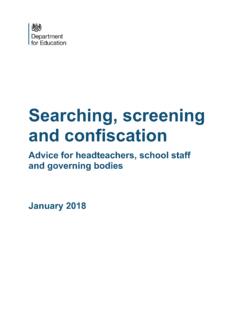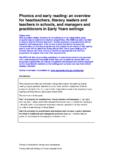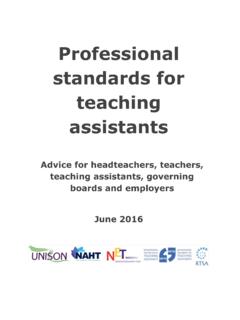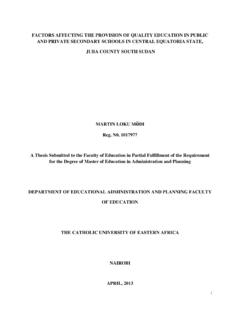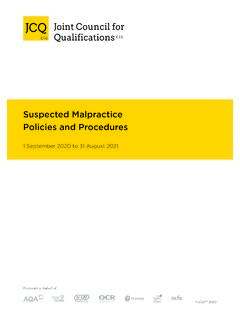Transcription of National standards of excellence for headteachers - GOV.UK
1 National standards of excellence for headteachers Departmental advice for headteachers , governing boards and aspiring headteachers January 2015. Contents Summary 3. About this departmental advice 3. Review date 3. Who is this advice for? 3. Main point 3. National standards of excellence for headteachers (2015) 4. Purpose 4. Preamble: the role of the headteacher 4. The Four Domains 5. Domain One 5. Domain Two 6. Domain Three 6. Domain Four 7. Supporting guidance 8. Who are the standards for? 8. What are the standards for? 8. What are the standards not for? 8. Using the standards 9. Further information 11. Appraisal 11. Equalities Issues 11. National programmes to support the development of middle leaders and senior leaders 11.
2 Teachers' standards 11. 2. Summary About this departmental advice This is departmental advice from the Department for Education. This advice is non- statutory, and has been produced for headteachers , governing bodies and aspiring headteachers . Review date This advice will next be reviewed by 2020. Who is this advice for? This guidance is for: headteachers and aspiring headteachers Governing boards Main point These standards replace the National standards for headteachers 2004. 3. National standards of excellence for headteachers (2015). Purpose The National standards of excellence for headteachers (2014) define high standards which are applicable to all headteacher roles within a self-improving school system.
3 These standards are designed to inspire public confidence in headteachers , raise aspirations, secure high academic standards in the nation's schools, and empower the teaching profession. The context for headteachers changes constantly. In most contexts, a headteacher has led one school; in some settings headteachers are responsible for leading more than one school. Job titles are various - including principal, executive, associate and co- headteacher as are the governance arrangements to which headteachers are accountable. These standards are intended as guidance to underpin best practice, whatever the particular job description of the headteacher .
4 They are to be interpreted in the context of each individual headteacher and school, and designed to be relevant to all headteachers , irrespective of length of service in post. The standards can be used to: shape headteachers ' own practice and professional development, within and beyond the school inform the appraisal of headteachers support the recruitment and appointment of headteachers provide a framework for training middle and senior leaders, aspiring to headship. The Teachers' standards (2011, as amended), including the Personal and Professional Code of Conduct which applies to all teachers, provide a foundation upon which the standards for headteachers are built.
5 Preamble: the role of the headteacher headteachers occupy an influential position in society and shape the teaching profession. They are lead professionals and significant role models within the communities they serve. The values and ambitions of headteachers determine the achievements of schools. They are accountable for the education of current and future generations of children. Their leadership has a decisive impact on the quality of teaching and pupils' achievements in the 4. nation's classrooms. headteachers lead by example the professional conduct and practice of teachers in a way that minimises unnecessary teacher workload and leaves room for high quality continuous professional development for staff.
6 They secure a climate for the exemplary behaviour of pupils. They set standards and expectations for high academic standards within and beyond their own schools, recognising differences and respecting cultural diversity within contemporary Britain. headteachers , together with those responsible for governance, are guardians of the nation's schools. The Four Domains The National standards of excellence for headteachers are set out in four domains, beginning with a Preamble. There are four excellence As Standard' domains: Qualities and knowledge Pupils and staff Systems and process The self-improving school system Within each domain there are six key characteristics expected of the nation's headteachers .
7 Domain One Excellent headteachers : qualities and knowledge headteachers : 1. Hold and articulate clear values and moral purpose, focused on providing a world- class education for the pupils they serve. 2. Demonstrate optimistic personal behaviour, positive relationships and attitudes towards their pupils and staff, and towards parents, governors and members of the local community. 3. Lead by example - with integrity, creativity, resilience, and clarity - drawing on their own scholarship, expertise and skills, and that of those around them. 4. Sustain wide, current knowledge and understanding of education and school systems locally, nationally and globally, and pursue continuous professional development.
8 5. Work with political and financial astuteness, within a clear set of principles centred on the school's vision, ably translating local and National policy into the school's context. 6. Communicate compellingly the school's vision and drive the strategic leadership, empowering all pupils and staff to excel. 5. Domain Two Excellent headteachers : pupils and staff headteachers : 1. Demand ambitious standards for all pupils, overcoming disadvantage and advancing equality, instilling a strong sense of accountability in staff for the impact of their work on pupils' outcomes. 2. Secure excellent teaching through an analytical understanding of how pupils learn and of the core features of successful classroom practice and curriculum design, leading to rich curriculum opportunities and pupils' well-being.
9 3. Establish an educational culture of open classrooms' as a basis for sharing best practice within and between schools, drawing on and conducting relevant research and robust data analysis. 4. Create an ethos within which all staff are motivated and supported to develop their own skills and subject knowledge, and to support each other. 5. Identify emerging talents, coaching current and aspiring leaders in a climate where excellence is the standard, leading to clear succession planning. 6. Hold all staff to account for their professional conduct and practice. Domain Three Excellent headteachers : systems and process headteachers : 1. Ensure that the school's systems, organisation and processes are well considered, efficient and fit for purpose, upholding the principles of transparency, integrity and probity.
10 2. Provide a safe, calm and well-ordered environment for all pupils and staff, focused on safeguarding pupils and developing their exemplary behaviour in school and in the wider society. 3. Establish rigorous, fair and transparent systems and measures for managing the performance of all staff, addressing any under-performance, supporting staff to improve and valuing excellent practice. 4. Welcome strong governance and actively support the governing board to understand its role and deliver its functions effectively in particular its functions to set school strategy and hold the headteacher to account for pupil, staff and financial performance. 6. 5.












